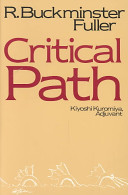Science Threatened Monarchical Power
Following the death of Christ and the preaching by his disciples, the promised prospect of salvation for all believers raised the Christian priest¬ hood to unprecedentedly powerful popularity. The combined religious and martial emperorship found its authoritarianly formulated credo (meaning "I believe") threatened by the B.C. Greek scientists' ever-unorthodox thinking and discovering. "Science," as Sir James Jeans said two millennia later, "is the earnest attempt to set in order the facts of experience." Scientific think¬ ing constantly discovered experimental evidence of the erroneous conceptioning of nonscientific authority. The emperor-pope did not want any of his subjects "attempting to set in order the facts of their own experiences."
To cope with the scientists' persuasive, experience-supported logic, the emperor needed popularly plausible divine authority. Though all acknowl¬ edged the emperor to be the unquestioned military leader, with absolute physical power, he needed also the only-by-God-to-be-given metaphysical dispensation assertedly relayed to the ordained priests by the succession of popes, an authority that was originally received from the disciples and by the disciples from the son of God and his direct authority from God. Thus "officially authorized," the pope-emperor could require all believers to se¬ cretly confess their sins to his officials. He could also ordain universal adop¬ tion of the most-useful-to-him explanations of the causality of all human experiences. The emperor-pope could tell his people how to behave, how to gain God's favor.
If the emperor-pope accredited the Alexandrian Greeks' development of the Sun-centered planetary system, he obviously could not maintain the log¬ ic of the concept of a two-dimensional, flat-out world sandwiched in parallel between Heaven above and Hell below. The concept of God in Heaven above, with a seat beside Him to which Christ had ascended, could not be maintained except in a world of commonly parallel-to-one-another, up-anddown, perpendicular trees and people on an infinitely, omnilaterally extend¬ ed, flat-world plane—around which the Sun and stars set and rose. This cosmology put the emperor-pope and his God at the center of Universe.
^ iie total overall evolutionary events of 400 to 200 B.C. in the eastern Mediterranean world saw all the extraordinary Greek intellectual activity transpiring almost exclusively in the city of Alexandria—founded by Alexander the Great in 332 B.C. on the delta at the westernmost mouth of gypt's River Nile. In 100 B.C. the Alexandrian library was said to have contained 700,000 volumes, or manuscript scrolls. Fortunately some of those volumes in Alexandria were meticulously copied and distributed to Ubraries around the civilized world of that time, for over 40,000 volumes of the Alexandrian library were burned in 47 B.C. during a siege in the war between Caesar and Pompey.
Notes:
Thus emperors sought to destroy learning and evidence-based reasoning.
Folksonomies: history science authoritarianism
Taxonomies:
/science/physics (0.571984)
/health and fitness (0.560791)
/religion and spirituality/christianity (0.502898)
Keywords:
Christian priest¬ hood (0.963265 (positive:0.585143)), authoritarianly formulated credo (0.960890 (positive:0.246564)), unprecedentedly powerful popularity (0.957163 (positive:0.585143)), plausible divine authority (0.950781 (positive:0.273475)), B.C. Greek scientists (0.946734 (neutral:0.000000)), unquestioned military leader (0.945241 (neutral:0.000000)), universal adop¬ tion (0.935074 (neutral:0.000000)), Sir James Jeans (0.935061 (neutral:0.000000)), only-by-God-to-be-given metaphysical dispensation (0.927262 (neutral:0.000000)), Alexandrian library (0.926249 (neutral:0.000000)), absolute physical power (0.919685 (positive:0.227425)), eastern Mediterranean world (0.895189 (neutral:0.000000)), Greek intellectual activity (0.893815 (neutral:0.000000)), overall evolutionary events (0.886963 (neutral:0.000000)), Alexandrian Greeks (0.812660 (neutral:0.000000)), Power Thus emperors (0.803011 (negative:-0.299392)), nonscientific authority (0.801539 (negative:-0.276627)), evidence-based reasoning (0.798842 (negative:-0.299392)), erroneous conceptioning (0.793522 (negative:-0.276627)), direct authority (0.793505 (neutral:0.000000)), earnest attempt (0.789116 (negative:-0.351318)), martial emperorship (0.788702 (positive:0.246564)), flat-out world (0.788687 (negative:-0.560873)), Scientific think¬ (0.784296 (negative:-0.276627)), Sun-centered planetary (0.783058 (neutral:0.000000)), ever-unorthodox thinking (0.782061 (positive:0.287264)), perpendicular trees (0.780336 (neutral:0.000000)), experience-supported logic (0.780258 (neutral:0.000000)), experimental evidence (0.776527 (negative:-0.276627)), civilized world (0.776006 (positive:0.591423))
Entities:
Alexandrian Greeks:Organization (0.876575 (neutral:0.000000)), Sir James Jeans:Person (0.768255 (neutral:0.000000)), River Nile:GeographicFeature (0.728992 (neutral:0.000000)), Christ:Person (0.674177 (neutral:0.000000)), Caesar:Person (0.652009 (neutral:0.000000)), Alexandria:Country (0.643401 (positive:0.591423)), Ubraries:City (0.628585 (positive:0.591423))
Concepts:
Alexandria (0.908082): geo | website | dbpedia | freebase | yago | geonames
Jesus (0.862436): dbpedia | freebase | opencyc | yago
Civilization (0.822099): dbpedia | freebase
Christianity (0.805371): dbpedia | freebase | opencyc
God (0.796785): dbpedia | freebase | opencyc
Authority (0.767280): dbpedia | freebase
Mediterranean Sea (0.680712): geo | dbpedia | freebase | opencyc | yago
Alexander the Great (0.671610): dbpedia | freebase | yago





